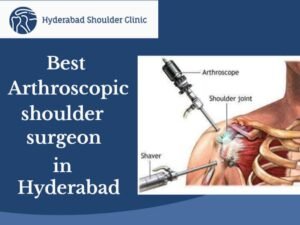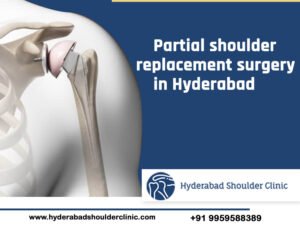In India every year, around 2 million people visit a doctor with rotator cuff related problems. But, “Are there different types of torn rotator cuffs?” The answer is yes. In the following, you will learn more about how many tears can occur in the rotator cuff and other related information. This includes multiple types of rotator cuff injuries, symptoms, and how your surgeon can heal them.
The shoulder joint is a very complex part of the body, which gives the arm extraordinary freedom of movement. However, this complexity also makes it very vulnerable to injury, and when injuries occur, the lack of mobility in these critical joints can be very uncomfortable. While most rotator cuff tears need treatment, not all tears are the same. If you or someone you love has a cuff tear, you should know the different types of rotator cuff tears, symptoms, and treatment options, so, this article provided by Dr Chandra Sekhar. B best shoulder Surgeon in Hyderabad gives you the required information.
Anatomy of the rotator cuff:

The rotator cuff consists of four tendons that work together to stabilize and move your shoulders. Each tendon connects the muscles in your shoulder blades to the bone in the upper arm called the humerus. The names of the rotator cuff tendon muscles are:
- Subscapularis: This runs in front of the upper part of the shoulder ball joint, called a humeral head.
- Supraspinatus: Runs over the top of your humeral head.
- Teres minor and infraspinatus: Run across the back of the upper arm bone.
What causes a rotator cuff tear?
Rotator cuff tears are common when cleaning windows or painting or in sports such as tennis or baseball. They often occur with normal wear from time to time or through repeated hand movements. However, you can also get tears by lifting something heavy or suddenly falling on your arm. Rotator cuff tears are the result of a combination of weakening your tendons with things like:
- Disuse
- Wear and tear
- Smoking
- Repeated use of cortisone steroid injection
Types of tears in rotator cuffs:

Rotator cuff tears can range from small to large. One or more of your tendons in the rotator cuff can be torn if you continue to work without treatment. You must get proper care so that your rotator cuff works optimally.
The following are some types of injuries that can cause a rotator cuff to tear:
- Partial Tear: Rotator cuff tendon damaged, but not completely torn. It is also known as partial thickness tear.
- Complete rotator cuff tear: This is when your soft tissue is divided into two separate parts. Tendons are often detached from the bones of the upper arm. Full-thickness tears don’t heal on their own because your muscles pull the edge of the tear apart. However, partial or full-thickness tears may stabilize and leave your shoulders with adequate function and comfort.
- Acute tear: These cracks are caused by injury/trauma, e.g. by falling or lifting something too heavy, too fast or uncomfortable. For example, if you lift a heavy object too awkwardly or too fast, you can tear your rotator cuff. If you experience a fall with your arms outstretched, it can also cause sharp tears. Injury to the shoulder, such as a sprained shoulder or broken collarbone, can also cause acute fractures to the rotator cuff.
- Degenerative injuries: Many tears in the rotator cuff are multifactorial in origin and occur by the gradual wearing down of the tendon. Genetics and specific health conditions such as high cholesterol and diabetes may also cause these injuries. Therefore, your dominant hand is more likely to be exposed to tears because you tend to use it more often and experience repeated stress.
Degeneration naturally also occurs with age and increases the risk of injury over time. Older people are more susceptible to this type of rotator cuff tear. Like muscles, your rotator cuff loses its vitality as you age. Various factors contribute to chronic or degenerative rotator cuffs. They include:- Repeated stress: Repeating the same shoulder movements over and over can cause tension in the muscles and tendons of your rotator cuff. Examples include sports such as weightlifting and tennis, as well as some routine and excessive activities and stress.
- Lack of blood supply: Blood supply to the rotator cuff tendon decreases with increasing age. If you do not have an adequate blood supply, your body’s natural ability to repair damaged tendons is disrupted, which can cause ligaments to tear.
- Bone spurs:As we age, bone spurs often develop in the lower acromion bone. When you raise your hand, these spurs begin to rub the rotator cuff tendons known as shoulder impingement. Since the tendons weaken over time they rupture is more likely. Shoulder impingement is a common cause of shoulder pain and occurs when your rotator cuff rubs your shoulder bones.

- Chronic injury: Wear and tear arising from repetitive stress happen in movements related to sports such as tennis, weight lifting, swimming, rowing and baseball, or by work such as carpentry and painting.
- Tendinitis: Tendinitis is an irritation or inflammation of a tendon connected to the bone. It causes pain in the area outside the joint. The shoulders of swimmers and pitchers are common to have tendonitis.
- Bursitis: Bursitis is when your bursa, a small bag of fluid that protects your rotator cuff, becomes irritated. It can cause when you repeat the same movements repeatedly, e.g. lifting something above your head or throwing a baseball. Infection can also cause bursitis.
- Tendons Strain or tears: With sudden injury or repetitive movements, a total or partial tear in your tendon can occur. If left untreated, tendinitis can also cause tendon rupture. Rotator cuff tear causes weakness, pain and the inability to move the arm freely with a variety of movements. Lifting and rotating arms can also be painful during any activity.
Symptoms of rotator cuff tear:

The most common symptoms of a rotating cuff are:
- Pain in the lateral area of the upper arm
- Pain during rest at night, especially if you sleep on an injured shoulder.
- Discomfort when lifting or moving the arm in a certain way.
- Weakness when rotating arms.
- Cracking or popping sensation when moving the hand in a particular position.
If tears are degenerative and develop over time, symptoms can develop gradually. However, it can be challenging to do regular daily tasks with shoulder muscles. If these symptoms occur, you should immediately talk to your doctor.
Rotator cuff repair:

If you suffer from a torn rotator cuff and continue to use it even though the pain is increasing, you can damage it even further. Rotator cuffs can become more significant over time. Chronic arm and shoulder pain is a good reason to contact a doctor. You can prevent symptoms from getting worse by getting early treatment. It can also help you get back to your routine faster.
The purpose of this treatment is to relieve pain and restore function. There are several ways to treat cuff tears, and the best choices are different for everyone. When compiling your treatment plan, your doctor will take into account your age, general health, level of activity and the type of rupture you have. The repair of the rotator cuff involves one or more of the following actions.
- Rest: Limit use of the shoulder, especially movements that strain the joints. Slingshot provides additional protection and rest.
- Change activity: Avoid or change activities and routine procedures that cause joint pain.
- Medications: Anti-inflammatory drugs can relieve pain and swelling.
- Exercise and Physiotherapy: Do special exercises to target the muscles in the shoulder to provide additional strength and support to restore movement, relieve pain and prevent further injury. Stretching exercises also help restore flexibility.
- Steroid Injections: If other methods are ineffective, local anaesthesia and cortisone can be injected into the shoulder to reduce inflammation and allow healing.
- Surgery: If non-surgical methods prove to be inadequate, rotator cuff tear surgery is the next option. For more details on operation, go through the

There are several benefits of having a rotator cuff tear operation. They include:
- Restore the lost function
- Improve shoulder mechanics
- Long-term improvement
Conclusion:
People with rotator cuff injuries usually recover well with treatment. However, it is common to hurt the same shoulder again, especially if you don’t change the way you use your shoulder. Older people tend to experience rotator cuff problems and find it more difficult to recover because their shoulders have an unstable blood supply.
For more information about rotator cuff tears and possible treatment options, contact Dr Chandra Sekhar. B shoulder surgeons at Hyderabad Shoulder Clinic call us at 91 9959588389. Our doctor, therapists and employees strive to offer you exceptional patient care. A doctor is an orthopaedic Shoulder surgeon board-certified and experts in the treatment of problems related to joints, bones, arms, legs, and spine. We treat various disease processes such as tendons, sports-related arthritis and ligament and tendon injuries. Contact our office at 91 9959588389 to make an appointment for rotator cuff surgery.





